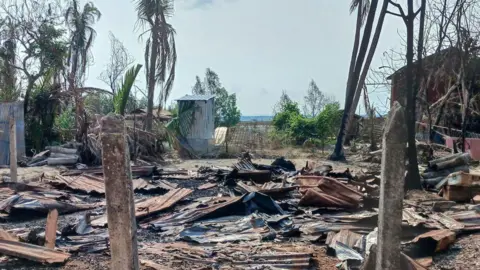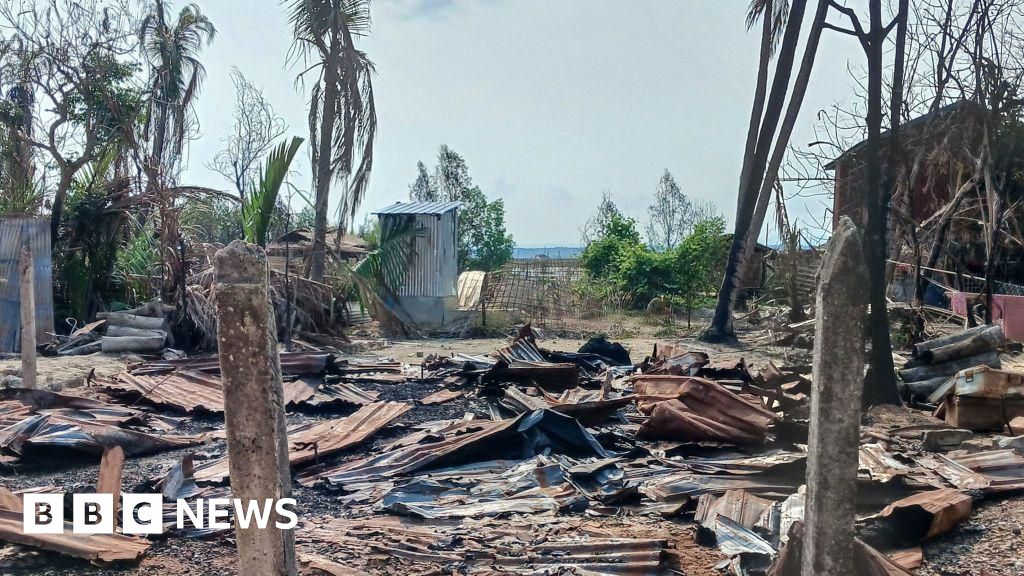 Getty Images
Getty Images
At least 50 people were killed by Myanmar soldiers in a raid on a village in Rakhine State last week, say local residents and opposition forces.
Warning: You may find some of the details in this piece disturbing
Eyewitnesses told the BBC the village was subjected to two-and-half days of terror as soldiers blindfolded and beat them up, poured burning petrol on their skin and forced some of them to drink their urine.
They were looking for supporters of the Arakan Army (AA), which has become one of the most effective ethnic fighting forces in Myanmar.
Fifty one people aged between 15 and 70 were “violently tortured and killed”, the National Unity Government (NUG), representing the ousted civilian government, said in a statement. The AA estimated the death toll to be more than 70 people.
The ruling military council, or junta, has denied the accusations, which would amount to one of the worst atrocities committed in the three year-old Myanmar civil war.
“They asked the men if the AA was in this village,” one woman told the BBC.
“Whatever answer they gave, whether they said AA was there or it wasn’t, or they didn’t know, the soldiers hit them.”
In just six months, the AA has swept through most of Rakhine State, forcing the military to keep retreating. It ended a ceasefire with the army last year and joined ethnic insurgents in other parts of the country in a combined operation aimed at overthrowing the junta which seized power in February 2021.
“I saw with my own eyes my husband being taken away in a military vehicle. My son was separated from both of us, and I don’t know where he is. Now I don’t know if my son and husband are alive or dead,” the woman told the BBC.
The names of witnesses are not being used to protect them. They told the BBC that everyone in the village, which has just over 1,000 households, were kept out in the open for two days, under the sun, with little to eat or drink, while dozens of men were tied, blindfolded and some taken away in trucks for further interrogation. Many are yet to return.
“They were so thirsty, standing all day in the sun, and begged for water. But the soldiers urinated in water bottles and gave them to the men,” the woman told the BBC.
She said she heard “lots of gunshots”, but didn’t see who was shot “because we had to keep our heads down”.
“I didn’t dare to look. They called someone standing near me. Then I heard a gunshot. He never came back.”
She she was crying throughout because she was worried about her husband and son: “I didn’t know if they were dead or alive. I was praying for them, ‘Buddha, please save them’.”
Survivors say they could hear soldiers asking for shovels to bury the bodies. They say some were clearly drunk.
More than 100 soldiers are believed to have raided the village Byai Phyu, which is just outside the state capital of Sittwe, on Wednesday.
Sittwe, a city with around 200,000 inhabitants, a large port and airport, is one of the Burmese army’s few remaining strongholds. But the insurgents are close, and enjoy the sympathy of much of the ethnic Rakhine population.
Men who had tattoos showing support for the AA were singled out for especially harsh treatment, locals said. One eyewitness said the soldiers cut out the tattooed skin, poured petrol onto it and set it alight.
Another eyewitness recalled an army officer telling the villagers he had come from the fighting in northern Shan State, where the military suffered heavy losses late last year, to take his revenge on them.
Losing Rakhine State on the border with Bangladesh would be one of the greatest humiliations ever suffered by the armed forces, which have dominated Myanmar since independence in 1948.
On Friday those left standing in the marketplace, mostly women, children and the elderly, were ordered to gather a few things and leave. They said the soldiers had already looted anything valuable, like gold, jewellery or solar panels from their homes. The locals were initially taken to a stadium in Sittwe, but most have moved to seek shelter in Buddhist monasteries in the city.
The BBC understands that the army still controls Byai Phyu, and no-one is being allowed back. There are reports that much of the village has been burned down.
The NUG has promised to bring those responsible for war crimes in Byai Phyu to justice. The AA also accused what it calls “the fascist military council” of “vicious cruelty”, and of gang-raping some of the women in Byai Phyu.
The junta has denied all allegations of torture, stating that they were only conducting “peace and security” measures in the village after spotting sandbag bunkers there. It accuses the Arakan Army of launching drone strikes from that area of Sittwe.
The isolation of Rakhine State and the intensity of the conflict make any independent investigation of what happened in Byai Phyu impossible for the foreseeable future.
But the accounts given by survivors are an ominous warning of what could happen elsewhere in Myanmar as the military continues to lose ground to an increasingly confident and capable armed opposition movement.
